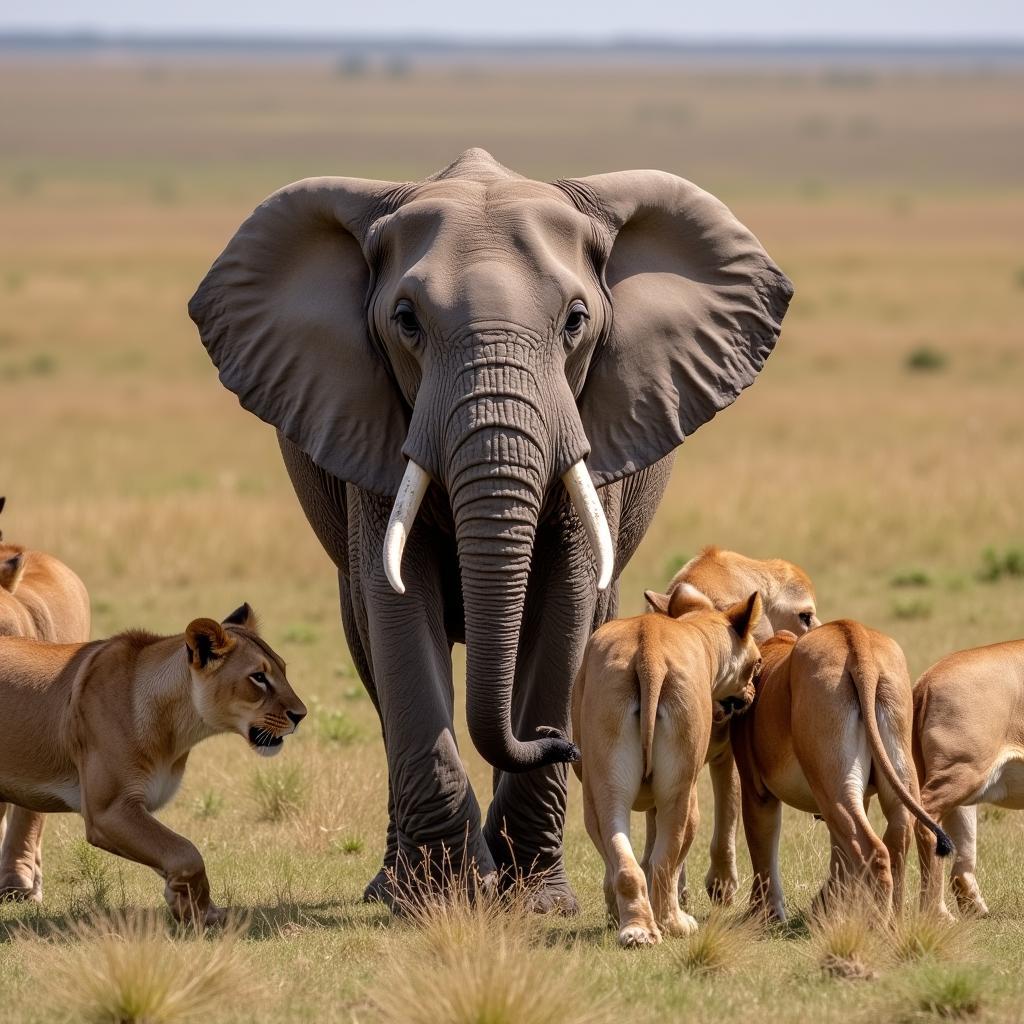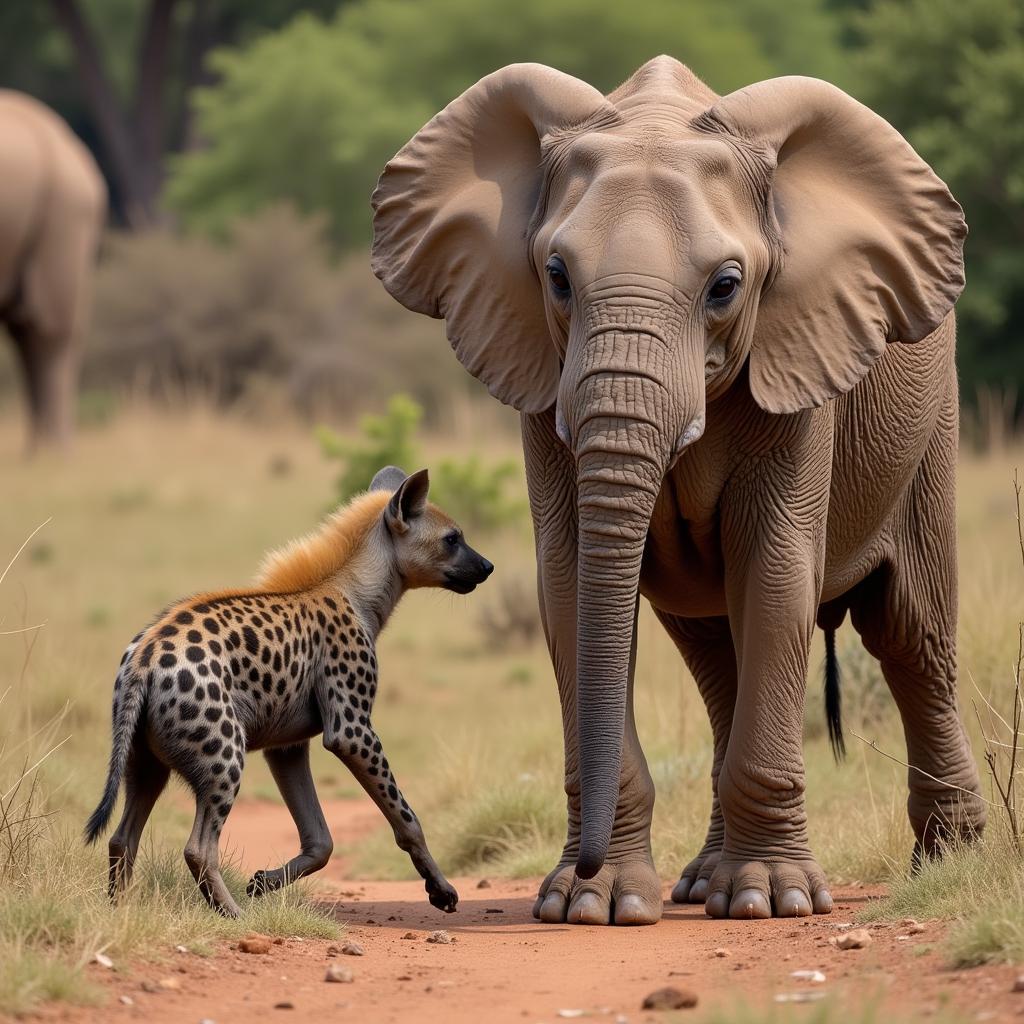The Predators of the African Bush Elephant: A Look at Nature’s Giants in Peril
The African bush elephant, an iconic symbol of the African savanna, is not without its enemies. While their sheer size and strength deter most predators, these gentle giants, particularly the young and vulnerable, do face threats from a select few formidable foes. Understanding these predator-prey dynamics is crucial for appreciating the delicate balance of the African ecosystem.
The King of the Jungle vs. the Colossus of the Plains: Lions and African Bush Elephants
Lions, the apex predators of the savanna, are among the few animals bold enough to challenge an African bush elephant. While a lone lion wouldn’t dare take on an adult elephant, a pride of lions, working in unison, can pose a significant threat, especially to vulnerable calves separated from the protection of the herd.
 Lions Surrounding African Bush Elephant Calf
Lions Surrounding African Bush Elephant Calf
These attacks are opportunistic, often occurring at night or during periods of drought when prey is scarce. Lions target the young, old, or weak, utilizing their agility and hunting prowess to bring down their massive prey. The elephants, in turn, rely on their size, strength, and matriarch’s leadership to defend themselves, often forming a protective circle around the vulnerable members of the herd.
“Witnessing a lion pride attempt to take down an elephant is a sight of both awe and brutality,” shares Dr. Amani Masika, a wildlife biologist with over 20 years of experience studying elephant behavior in Tanzania. “The elephants fight back with incredible ferocity, using their tusks and massive weight to deter the lions.”
Stealthy Hunters in the Night: The Threat of Spotted Hyenas
While lions are the most recognized predators of African bush elephants, spotted hyenas are equally formidable adversaries. Their intelligence, powerful jaws, and relentless scavenging nature make them a constant threat to elephant calves. Hyenas often target vulnerable youngsters, particularly those that are sick, injured, or separated from the herd.
 Spotted Hyena Approaching African Bush Elephant Calf
Spotted Hyena Approaching African Bush Elephant Calf
Unlike lions, hyenas rarely attack healthy adult elephants. However, they will readily scavenge on elephant carcasses, playing a vital role in the ecosystem by recycling nutrients and maintaining a healthy balance.
The Human Factor: Poaching and Habitat Loss
While lions and hyenas are natural african bush elephant predators, the most significant threat to these magnificent creatures comes from humans. Poaching for ivory and habitat loss due to human encroachment have decimated elephant populations across Africa.
“It’s a tragedy that these intelligent, social animals are being driven to the brink of extinction by human greed and shortsightedness,” laments Dr. Masika. “We must act now to protect these magnificent creatures and ensure their survival for generations to come.”
FAQs: Predators of African Bush Elephants
What animals prey on African bush elephants?
The primary predators of African bush elephants are lions and spotted hyenas.
Are adult African bush elephants vulnerable to predators?
Adult African bush elephants are rarely attacked by predators. However, lions and hyenas may target the young, old, sick, or injured individuals.
Why do lions and hyenas attack African bush elephants?
Lions and hyenas prey on African bush elephants primarily for food. Elephant calves, in particular, are a valuable source of protein.
How do African bush elephants defend themselves against predators?
African bush elephants rely on their size, strength, and the protection of the herd to defend themselves. They often form a protective circle around the vulnerable members of the herd, using their tusks and massive weight to deter predators.
Exploring the African Wilderness: Further Reading
Interested in learning more about the fascinating world of 10 african animals? Delve into these captivating articles:
- African Buffalo Botswana: Discover the incredible adaptations of this iconic African herbivore.
- African Forest Elephant Adaptations: Uncover the unique features that allow forest elephants to thrive in their dense rainforest habitat.
For any inquiries or assistance in planning your African safari adventure, contact us at:
- Phone: +255768904061
- Email: kaka.mag@gmail.com
- Address: Mbarali DC Mawindi, Kangaga, Tanzania
Our dedicated team is available 24/7 to assist you.


